World Cup 2034 in Saudi Arabia: what can we expect and why is it controversial?
FIFA announced this week that the tournament will be held in Saudi Arabia in 2034, a decision which has not been well received across the football world
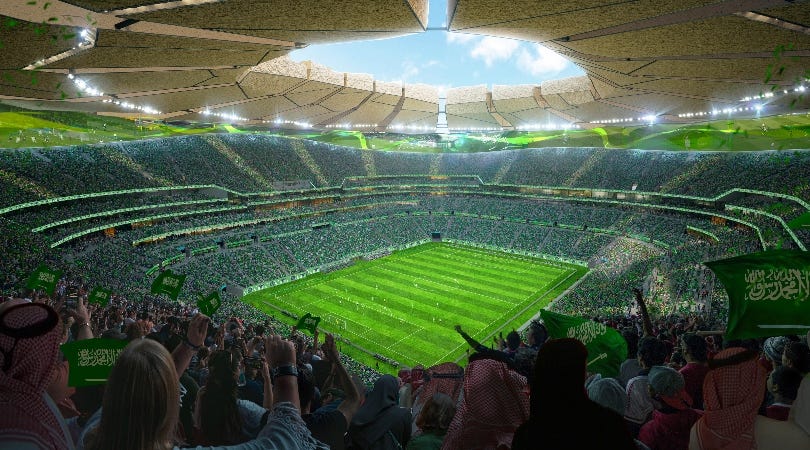
FIFA’s open secret became official news this week as Saudi Arabia was announced as the host of the men’s World Cup in 2034 in a decision which has surprised nobody and upset many.
Saudi Arabia was the sole bidder for the 2034 tournament and confirmation that the nation will stage the 2034 edition came at Wednesday’s Extraordinary FIFA Congress meeting following a vote.
On the same day, it was also confirmed that Spain, Portugal and Morocco will host the 2030 World Cup, which will feature matches in Uruguay, Argentina and Paraguay to mark the 100th anniversary of the tournament.
But if a World Cup staged in six different countries appears highly unusual, it is the choice of Saudi Arabia which has caused the biggest stir this week. So what can we expect from a World Cup in Saudi Arabia? And why is it controversial?
What are Saudi Arabia planning for the 2034 World Cup?
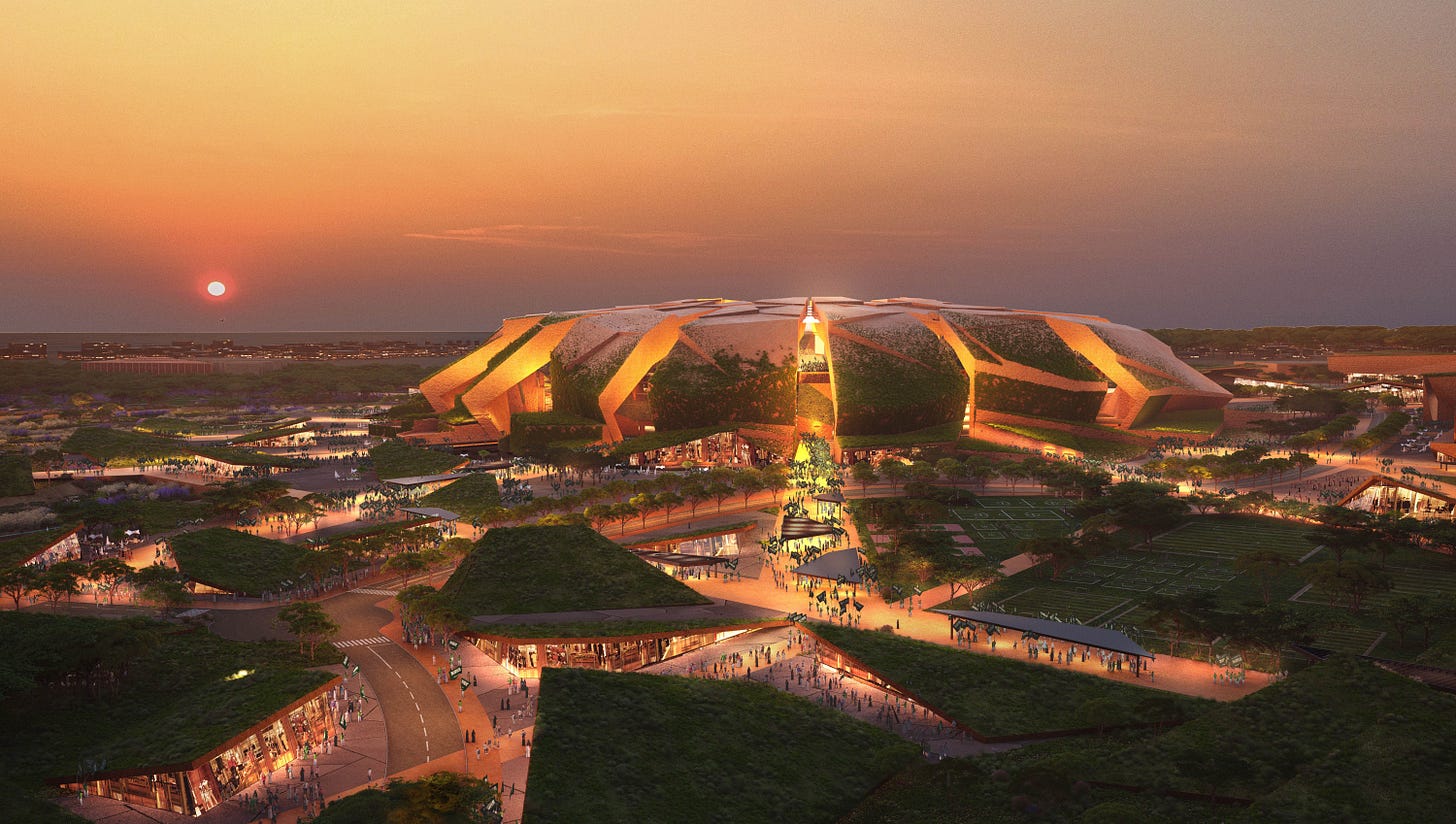
Saudi Arabia has invested around £5 billion in sports since 2021, with huge spending to attract major sporting events to the nation as part of the kingdom’s strategy to diversify its economy and move away from a dependence on fossil fuels.
Football has been at the centre of that development, with a huge outlay to turn the Saudi Pro League into one of the world’s fastest-growing and exciting competitions, luring the likes of Cristiano Ronaldo, Neymar and Karim Benzema to the kingdom.
Hosting the World Cup was part of the long-term vision put forward by crown prince Mohammed bin Salman. The tournament will be played in 15 stadiums in five cities, with eight of the grounds located in the capital Riyadh.
But of those 15 stadiums, only four have been built. One of the venues, the Neom Stadium, will be set 350 metres above ground level. Only accessible via high-speed lifts and driverless vehicles, it will be located in a city which has not even been built as part of Saudi Arabia’s ‘The Line’ project.
What will be the environmental impact?

FIFA had promoted the Qatar World Cup in 2022 as the first completely climate neutral tournament. But anyone who attended the World Cup or the nation during the tournament would have found that extremely difficult to believe and it was hardly a surprise when an independent regulator revealed in 2023 that those claims were highly misleading.
With 11 stadiums yet to be built for the 2034 World Cup, along with 10 fan parks, plus hotels, airports and high-speed rail links, the environmental cost looks set to be high.
Given the location of Saudi Arabia, most fans hoping to attend the tournament will be required to fly and given the distance between host cities, those supporters are also likely to have to have to take internal flights in order to watch their team in multiple matches during the World Cup.
Already accused of negatively impacting climate change and blocking climate action due to its use of fossil fuels, Saudi Arabia has defended its record on sustainability and claims it is not using sport to distract from those goals.
Why are human rights activists unhappy?
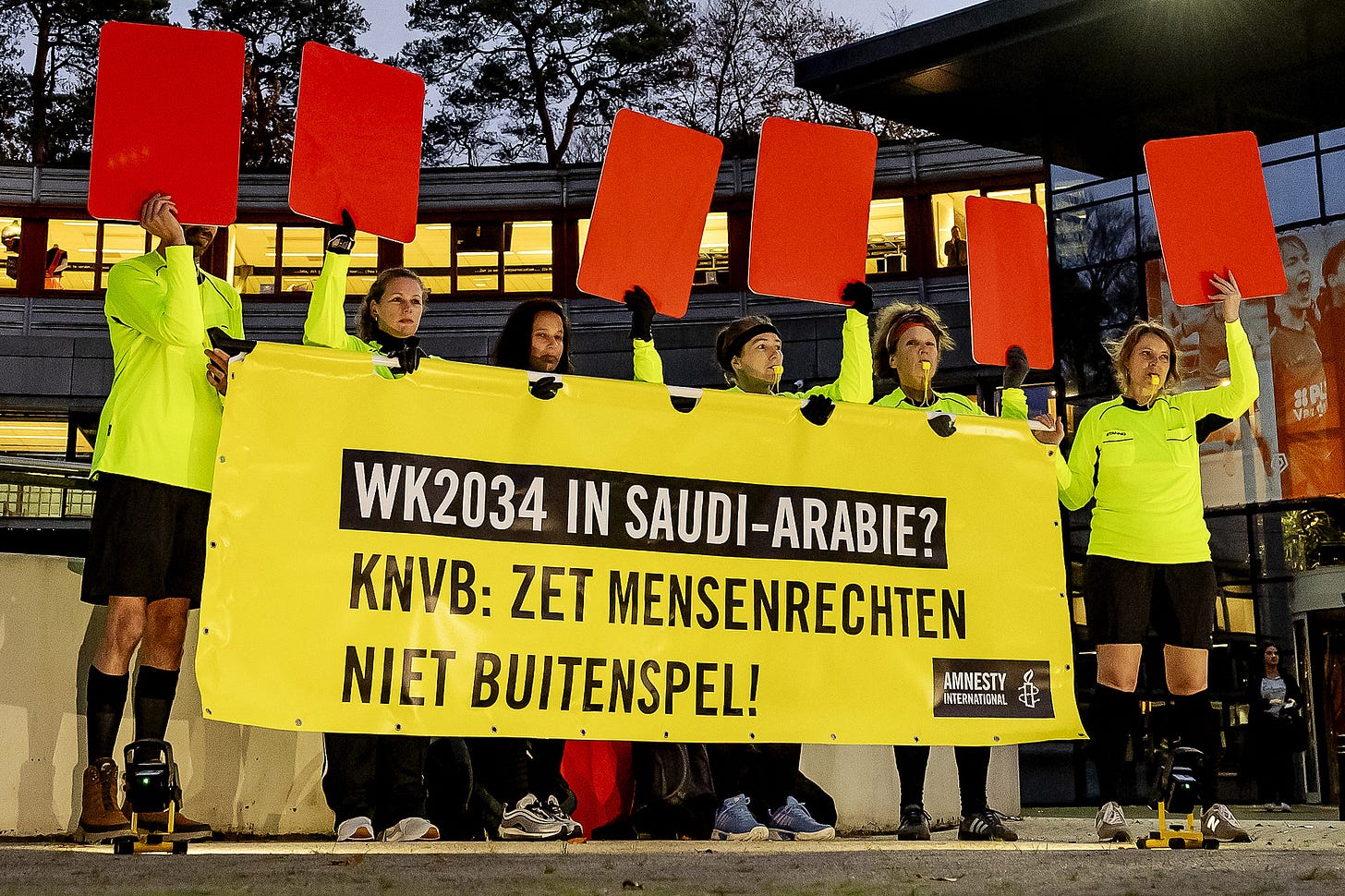
Human rights was an issue in Qatar and will be again in Saudi Arabia, with Amnesty International condemning the decision to hold the 2034 World Cup in the kingdom.
“FIFA’s reckless decision to award the 2034 World Cup to Saudi Arabia without ensuring adequate human rights protections are in place will put many lives at risk,” Amnesty International’s head of labour rights and sport, Steve Cockburn, said.
“Based on clear evidence to date, FIFA knows workers will be exploited and even die without fundamental reforms in Saudi Arabia, and yet has chosen to press ahead regardless. The organisation risks bearing a heavy responsibility for many of the human rights abuses that will follow."
Along with concerns over conditions for migrant workers, Saudi Arabia has faced criticism for women’s rights abuses, the criminalisation of homosexuality, the restriction of free speech and the war in Yemen.
Another winter World Cup?

The 2022 World Cup in Qatar was switched to the winter due to the extreme heat in the summer and with similar climatic conditions in Saudi Arabia, another winter World Cup seems inevitable.
“Why not see what the possibilities are to do it in the summer? Whether it is summer or winter it doesn't matter for us, as long as we make sure that we [deliver] the right atmosphere to host such an event,” sports minister Prince Abdulaziz told the BBC.
Average daily temperatures range between 27C and 43C in inland areas between May and September, and 27C to 38C in coastal regions. There would be milder conditions between October and April, though, with average daily temperatures in host cities ranging between 15C and 30C.
As with Qatar 2022, a possible winter World Cup in Saudi Arabia would mean a mid-season break in the traditional football calendar to incorporate the tournament, probably in November and December once again.
Russia, Qatar, Saudi Arabia
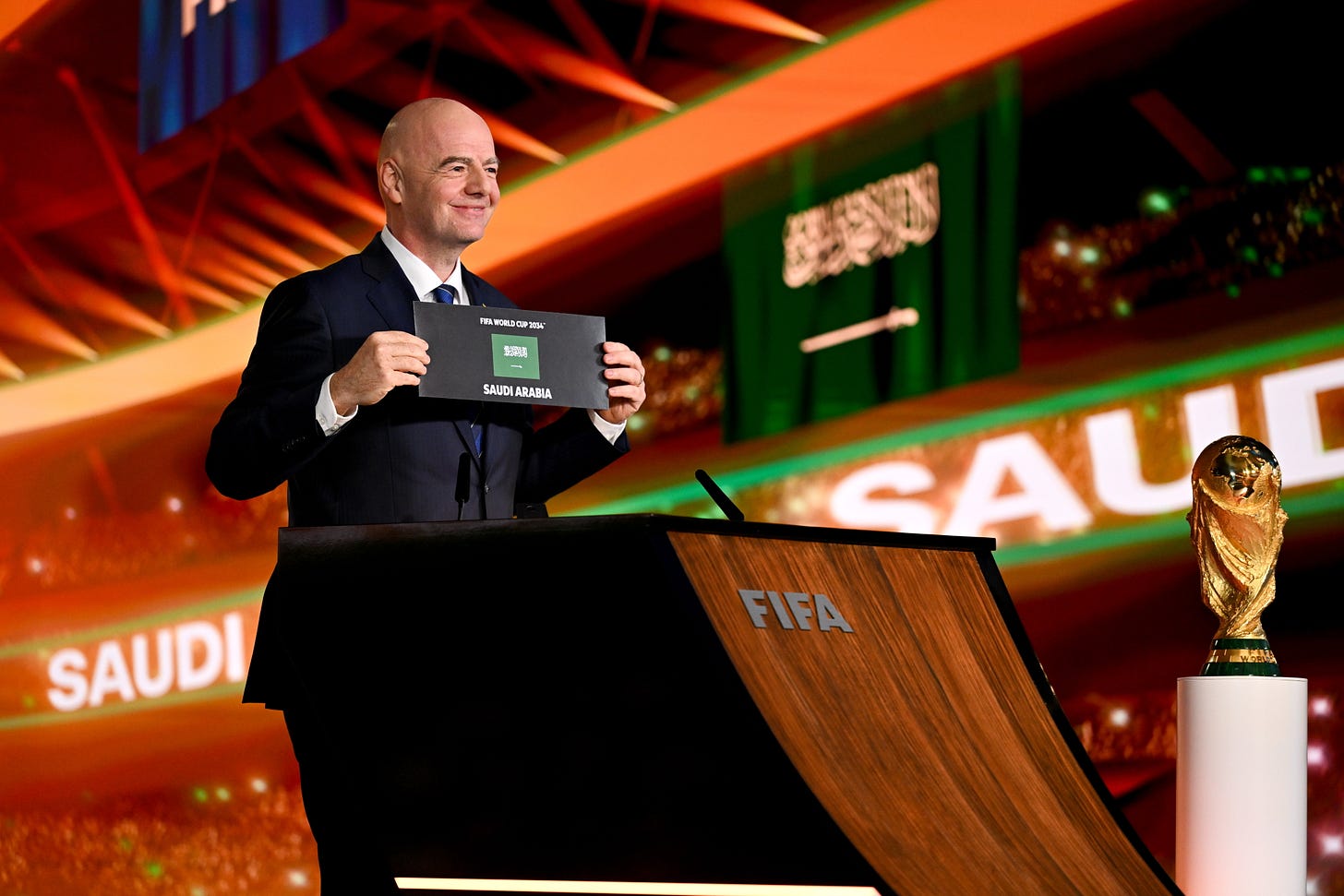
After World Cups in Russia and Qatar, Saudi Arabia has now been selected to host the 2034 tournament and it is difficult to conclude that those decisions were based on anything other than money.
All three nations have been accused of sportswashing, a term used to describe “the practice of nations, individuals, groups, corporations, or the government using sports to improve reputations tarnished by wrongdoing”.
FIFA had said that, due to the rotation principle, the 2034 World Cup would have to be held in either Asia or Oceania. Australia had considered a bid, but quickly decided against it, leaving Saudi Arabia as the only bidder.
A longer, more transparent process with other bidders would have allowed for more scrutiny and an open vote. Instead, this looks like a closed shop. And while a number of national federations expressed their concerns at Saudi Arabia’s human rights record in particular, ultimately there was no other choice.
Will it be inclusive and fun for fans?
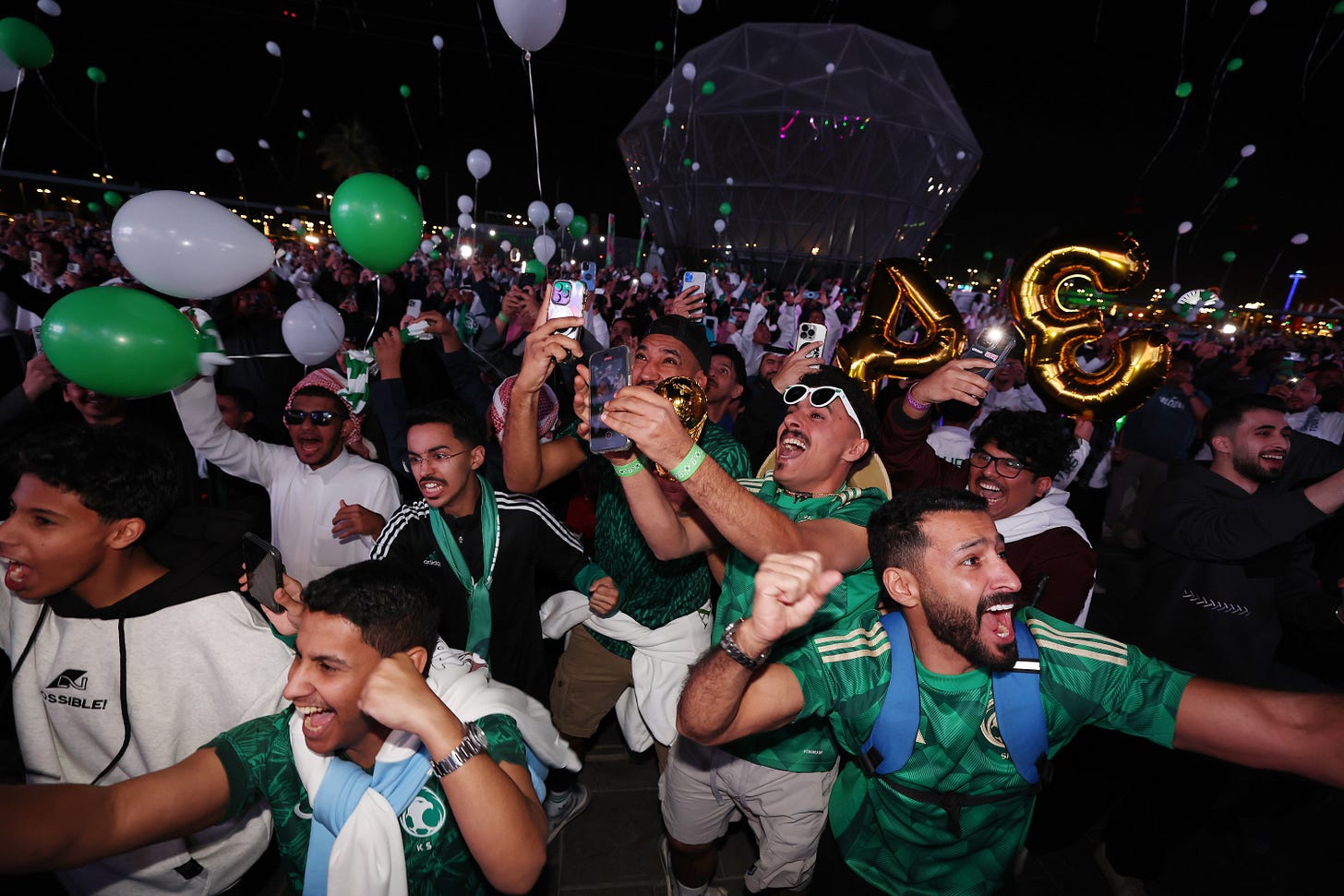
Qatar 2022 was different. It was the first time a World Cup had taken place in the Middle East and the tournament was certainly colourful. Venues were shiny and new; and the football was entertaining.
But it lacked the atmosphere of previous tournaments. Perhaps that was because of the prohibitive costs of travelling and attending the World Cup for fans, or due to the fact that many did not feel they would be welcome.
Saudi Arabia has said that “everyone is welcome”, although with same-sex relations illegal and transgenderism not recognised, whether that is actually true remains to be seen. Alcohol is also prohibited.
“We have hosted over a hundred sporting events, welcoming three million sports fans with no alcohol,” Hammad Albalawi of the Saudi Arabian Ministry of Sport told Sky earlier this year. “They have enjoyed their time and discovered what Saudi has to offer – entertainment, art, music, culture and heritage.”


great piece, the 2030 World Cup should be incredible. It is crazy to think that Mbappe will be 31 by then, and 35 by the Saudi Arabia World Cup.
I’m not wondered by bribery level of FIFA white collars, in 1978 WC was played in Argentina under dictatroship, then they introduce match schedules at 12.00pm under burny sun in WCs in Mexico and USA. I do remember Byron Moreno’s corrupted refereeing in 2002 between Italy and South Korea. They excluded Russia but not Israel. In conclusion: FIFA = MAFIA